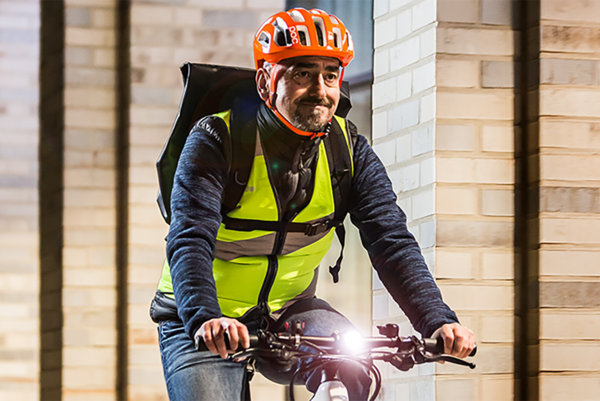
Mitigating urban traffic – the case for cargo bikes
Share blog article:
According to the Climate Protection Act (Klimaschutzgesetz, KSG), the Federal Republic of Germany is obliged to reduce its CO2 emissions by a third by 2030. At around 94%, road traffic contributes by far the largest share of total traffic emissions. The Bundesverband Zukunft Fahrrad (BVFZ) would like to tackle this situation; it is campaigning for more support of cargo bikes and the underlying infrastructure.
The bike at the hub of the mobility transition
The road traffic transition and the committed reduction in emissions will not be achieved by switching from the internal combustion engine to electric drive alone. Offering great potential as another alternative, the bicycle is moving into the focus. According to a study by the German Aerospace Center (DLR) commissioned by the Federal Ministry of Transport in 2016, up to 22.6% of all commercial traffic in Germany could be shifted to cargo bikes in the future.
In order to establish the bicycle as an equal means of transportation, government support and infrastructure would need to be adapted accordingly. Cycling must be safe everywhere, not just in the most bike-friendly cities. Parking facilities that protect against theft and vandalism are also necessary if cargo bikes are to replace cars and numerous vans in the long term. These goals prompted the BMVI to launch its “Urban Logistics Support Program” in early 2019.
Support for stronger impetus
There is no doubt that the health-promoting and emission-free bicycle, as well as the cargo bike, call for further support and need public advocates in order to be able to compete as equal means of transport with cars and local public transport. In France, for instance, the switch from high-pollution cars to low-emission e-cars is currently being subsidized, as is the switch to e-bikes. Regardless of whether it is an e-cargo bike or a regular e-bike, private individuals receive subsidies of up to 2,500 euros from the government.
In Germany, subsidies of this nature are provided at the federal state level. The federal states currently offer various funding options for cargo bikes, but these differ greatly from case to case and are not accessible to everyone. The most straightforward way to own a cargo bike is via company bike leasing.
Who is entitled to subsidies?
The bicycle is widely accepted by much of the population as a means of everyday transportation, and people are generally open-minded to the use of cargo bikes. More and more people are prepared to do their errands by cargo bike. Regardless of whether the children need to be brought to kindergarten or the weekly grocery shopping is on the agenda: according to a survey conducted by the BMVI’s Fahrradmonitor in 2019, 10% of Germans are inclined to buy a cargo bike. A full 20% would also be interested in cargo bike sharing models.
The potential extends far beyond private uses. Tradesmen, suppliers, caterers and many more could also use the cargo bike for their business. The list of interested parties is at least as long as the potential uses. Also, the increasing number of cargo bikes in street traffic creates more awareness, positively influencing people’s attitudes. More and more people are becoming aware of how many advantages the bike offers in driving the mobility transformation and how road traffic could be mitigated through the switch from cars to bikes.
This is because cycling as a means of short- and medium-range transportation not only reduces emissions, particularly in urban areas, but also makes traffic safer and quieter, thus improving the quality of life.
Bikeleasing is for everyone
To date, the focus of government subsidies has been primarily on private and municipal corporations, municipal authorities and universities as well as registered associations. So far, private individuals have had little chance of receiving funding. The advantages of bike leasing, on the other hand, are available to everyone – employees and employers as well as private individuals. More than 60,000 companies are already offering their employees the option of leasing a company bike, thus actively supporting the traffic transition and the trend toward environmental awareness and health improvement.
Find out what funding options are available to you in your federal state in Germany or Austria. If none of the subsidies apply to you, feel free to contact us. Together we’ll find the way to your company bike – whether it’s a cargo bike, mountain bike or e-bike.
Source: Bundesverband Zukunft Fahrrad (BVZF)



